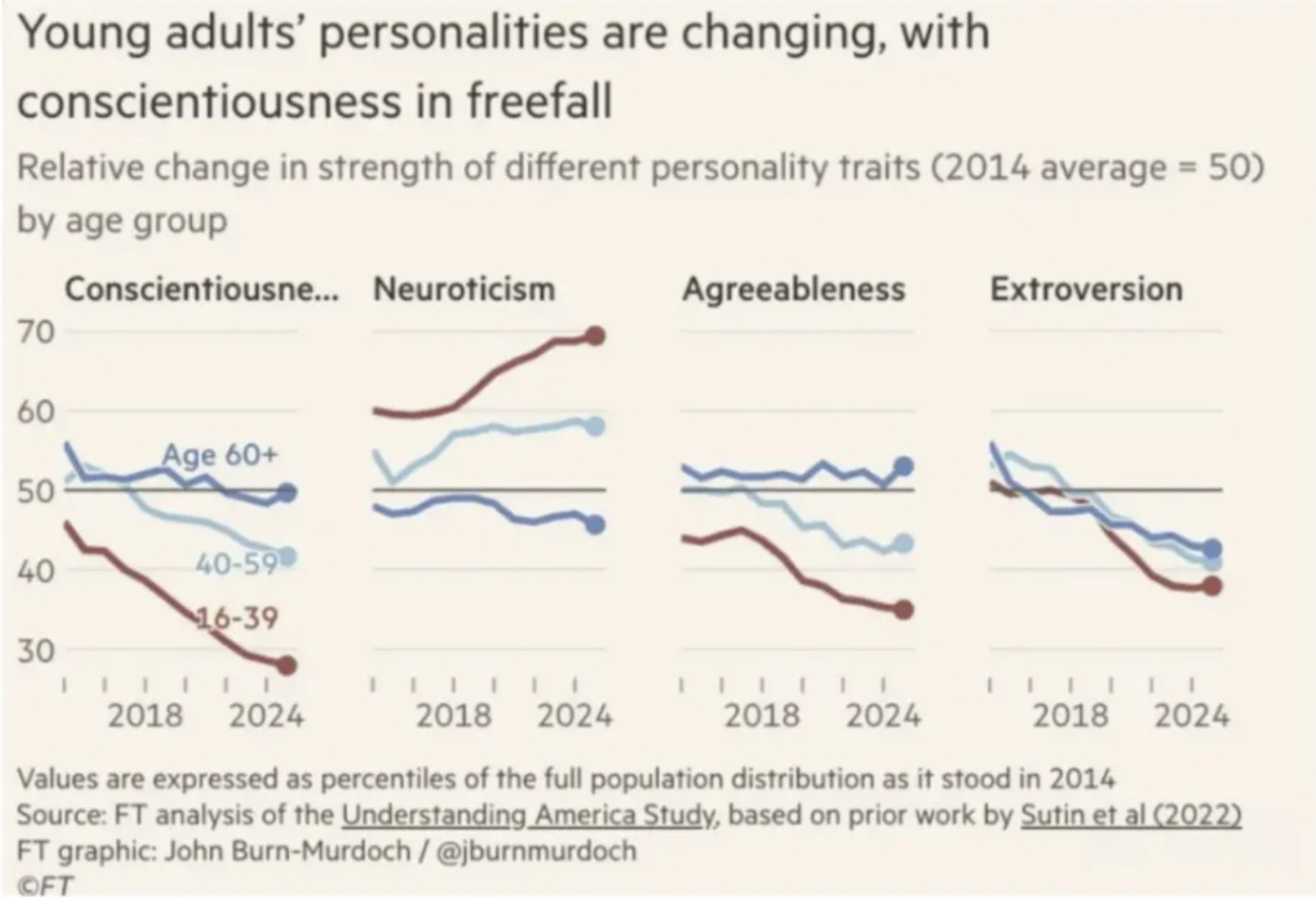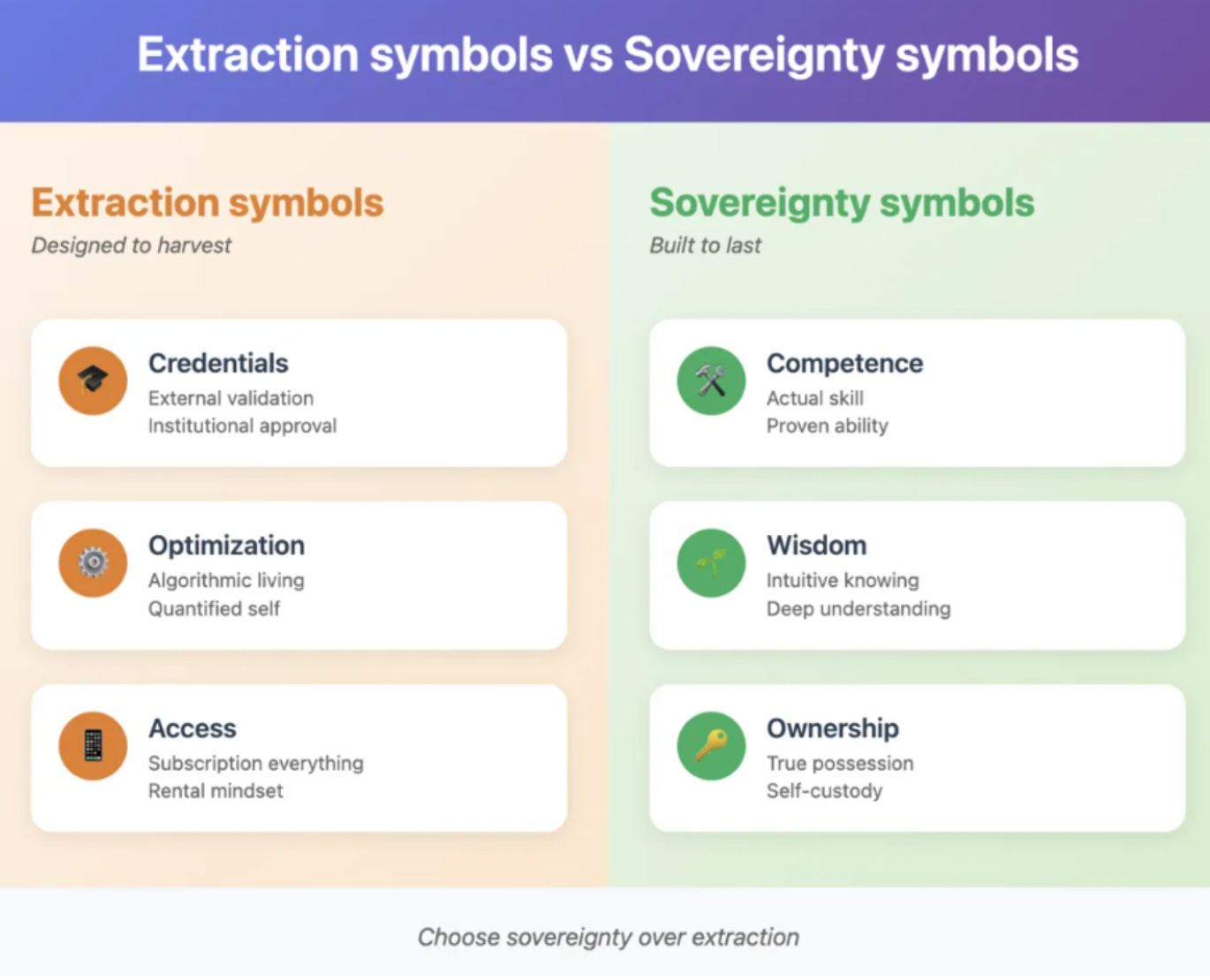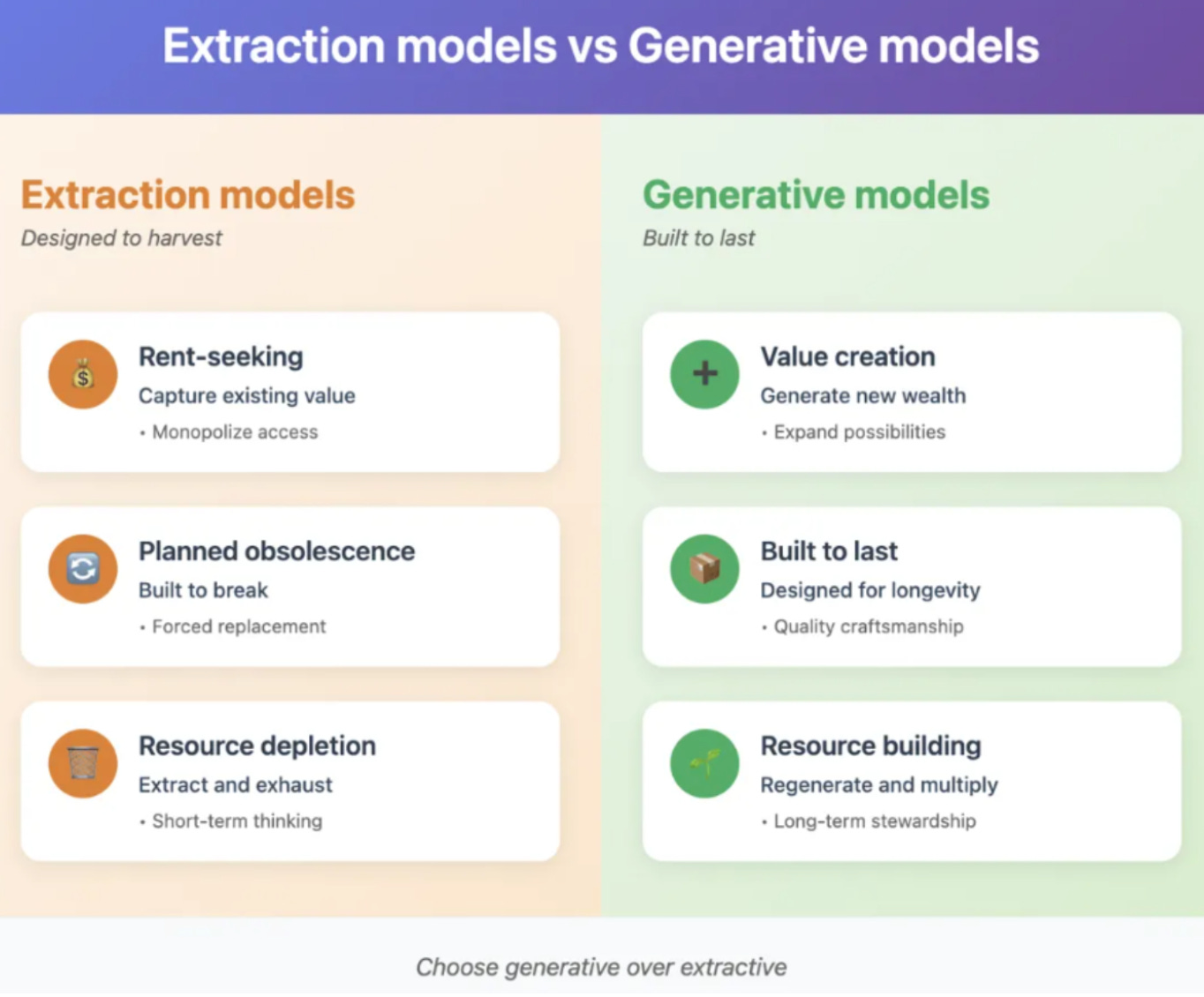From Fiat Everything to Real Everything
Why Old-World Values Are the Ultimate Modern Rebellion
The infrastructure is now visible to those willing to see it. The systematic replacement of natural systems with artificial ones has reached into every domain—money, food, health, education, information. What began as isolated changes has revealed itself as a coordinated operation: the complete substitution of reality with decree, ownership with access, competence with credentials.
The mathematical engineering of ownership out of reach becomes clear—from 52% of 30-year-olds owning homes in 1950 to a projected 13% by 2025. Extraction was rebranded as liberation—the subscription economy that converts your $3,000 monthly into someone else's equity while you build nothing. These aren't separate trends but components of what I documented in Fiat Everything—the coordinated substitution of authentic systems with fabricated ones designed for extraction. That piece showed how the fiat money template spread across every domain of human experience: creating artificial scarcity, manufacturing dependency, and harvesting human energy through decree rather than value creation.
But the operation runs deeper than the economic and cultural plunder I previously documented. They didn't just loot us financially and culturally. They rewired our psychology to make resistance impossible.
The Warning: Catherine's Panopticon
Catherine Austin Fitts published Plunder: Financing the Panopticon last week, connecting dots that reveal the full scope of the operation. The surveillance infrastructure isn't just watching us—it's actively conditioning us for compliance. What she calls the "panopticon" creates the psychological substrate that makes extraction possible. Her work has long explored themes of sovereignty and financial freedom, but this latest analysis shows the endgame: we're not just being robbed—we're being programmed to participate in our own robbery.
This is the villain's masterpiece: a system so sophisticated it harvests not just our wealth but our very capacity for resistance.
The data proves the conditioning is working. A chart published last week by Financial Times data reporter John Burn-Murdoch shows young adults' personalities changing in real-time.
Conscientiousness—the trait that builds wealth, delays gratification, and resists manipulation—is in freefall among 16-39 year-olds. While older generations maintain stable personality patterns, younger cohorts show dramatic psychological shifts perfectly timed with the maturation of surveillance capitalism.
This isn't natural personality change. It's engineered compliance. What began as laboratory experiments in consciousness control has evolved into mass media entrainment—the killer application of psychological manipulation. The recent certification of a class action lawsuit by children of MKUltra victims—including researcher
—demonstrates these weren't isolated experiments—they were the prototype for mass psychological conditioning.Lower conscientiousness creates perfect citizens for a fiat world: impulsive, debt-prone, dependent on external validation, incapable of long-term planning. The same systems that price you out of ownership simultaneously condition you to prefer access over assets, subscriptions over purchases, digital relationships over physical community.
The feedback loop is elegant and vicious. Economic desperation drives people into surveillance systems—need the app for the gig job, need the credit score for the apartment, need the platform for the side hustle. The surveillance conditions breed psychological dependency. The dependency ensures continued participation in extraction. Each interaction harvests both your data and your agency, creating citizens who are easier to manage and harder to satisfy.
This system isn't just a control mechanism—it's a wealth extraction machine that pays for itself by making its subjects psychologically incapable of resistance.
Optimized to Be Harvested
The modern predicament runs deeper than financial extraction. We've been systematically optimized to be exploited across every domain of human experience. Our attention spans have been shortened to match advertising cycles. Our reward systems have been hijacked by dopamine-driven platforms. Our social connections have been mediated through algorithms designed to increase engagement, not satisfaction.
Consider how this optimization works in practice. Traditional cultures taught patience through necessity—growing food required seasons, building skills required years of apprenticeship, raising children required decades. Modern systems eliminate these natural training grounds for conscientiousness. Food comes instantly through apps—often factory-made substances engineered for addiction. Nourishment grown in soil has been replaced by chemistry optimized for profit, not health.
Skills are promised through weekend bootcamps instead of multi-year apprenticeships. Relationships form through swipes rather than shared work and years of building trust.
The removal of natural resistance-building experiences isn't accidental. A population that can't delay gratification is a population that can't build wealth. Citizens who can't focus deeply are citizens who can't think systemically. People who can't form lasting bonds are people who can't organize effective resistance.
We've been conditioned to chase extraction symbols—external markers of success that actually make us poorer: credentials over competence, optimization over wisdom, access over ownership. Meanwhile, we've been trained to ignore sovereignty symbols—the markers of actual independence: real skill, intuitive knowing, true possession.
The result is a generation whose labor creates unprecedented value—yet most of that wealth flows upward, leaving them building less personal wealth than their parents while staying more "informed" yet understanding less truth, feeling more connected while experiencing profound isolation.
The Modern Predicament
Here's the uncomfortable reality: we're all creatures of the system we're critiquing. Every convenience that makes modern life possible also makes modern control inevitable. The same technologies that enable global communication enable global surveillance. The same platforms that democratize information also weaponize attention. The same systems that promise freedom deliver sophisticated bondage.
Many people hit middle age and realize they learned all the wrong things. I certainly did. They optimized for metrics that turned out to be mirages, built careers in industries designed to extract value rather than create it, spent decades playing a game rigged against them while mistaking the ability to navigate the maze for intelligence.
This realization can be harrowing—or liberating. It's the difference between despair and awakening, between accepting defeat and choosing resistance.
The Search for Real Solutions
As more people realize everything is bullshit and start looking for genuine answers, something interesting happens: many of the solutions are found in the past. Not because we should abandon technology or retreat from modernity, but because we discarded methods and attitudes toward life, humanity, and time itself that actually worked.
People enter this awakening through different doors. Catherine's path was financial sovereignty, but others come through food (realizing our nutrition system is poisoned), pharma (seeing medicine turned into subscription extraction), education (recognizing schools as indoctrination centers), or media (watching narrative engineering in real-time). The entry points may differ, but for anyone who has the capacity to keep going, the destination is the same: understanding that our world has been systematically fabricated, and searching for what's actually real.
Thinkers are emerging with solutions on multiple fronts. Catherine Austin Fitts, who has been documenting financial corruption and building sovereignty frameworks for decades, provides the master-level map of the financial terrain and the tools for navigating it. Her work at The Solari Report is a graduate course in building financial sovereignty. Jeffrey Tucker offers something complementary: a playbook for rethinking how to operate in modern life while maintaining the founding fathers' mentality toward freedom and self-reliance.
That solutions are emerging simultaneously across multiple fronts suggests we've reached a tipping point—the extraction systems have become visible enough that resistance frameworks are crystallizing organically.
His latest book, Spirits of America: On the Semiquincentennial, crystallizes this approach into a systematic framework. Drawing from Eric Sloane's forgotten wisdom in The Spirits of '76, Tucker has created what amounts to a survival manual for maintaining human agency in an extractive world.
Tucker's journey mirrors that of millions of us who've been peeling back the facade across every domain—from COVID policy to food systems to financial extraction. As founder of the Brownstone Institute, what began as libertarian opposition to lockdowns evolved into recognition that the fight spans the entire spectrum of human experience. His recent acknowledgment that covid vaccine injuries are 'wildly underestimated' exemplifies this awakening—moving from questioning individual policies to documenting systematic harm across institutions. As our collective Overton window shifts, more people are connecting dots across previously separate areas of concern.
This raises the inevitable question: once you see the scope of the problem, what do you do? While many of us might wish we were Amish (that ship has sailed for most of us), Tucker offers something more practical: how to live with founding fathers' principles in a world of smartphones and surveillance capitalism. He's not advocating retreat from modernity but showing how to navigate it without surrendering the character traits that made America's founders ungovernable.
Tucker's Pure Vision
What strikes me about this book is its purity and efficiency. When Jeffrey told me readers might think "anyone can write a book" after reading it, he wasn't being modest—he was identifying its power. In a world drowning in manufactured complexity, this 120-page work is as efficient as it is inspiring, cutting through the noise to reach essential truths.
The book's elegance lies not in sophisticated theory but in its radical simplicity. Tucker has identified the specific practices that make fiat systems powerless—not through retreat from modernity, but through applied philosophy for maintaining sovereignty within it.
The framework Tucker presents is remarkably simple—a few practices that make humans uncontrollable:
Long-time preference over instant gratification. In a world engineered for addiction to the immediate, the ability to delay gratification becomes revolutionary. When you can wait, you can't be rushed into bad decisions. When you can save, you can't be trapped in debt cycles. When you can plan decades ahead, you can't be manipulated by quarterly thinking. This isn't just financial advice—it's psychological warfare against systems designed to harvest your impulses.
Craftsmanship over disposable consumption. Real skill-building creates antifragility. The person who can fix, build, grow, or repair something valuable becomes harder to control. Craftsmanship builds the patience and attention span that surveillance capitalism deliberately erodes. It creates real value instead of renting access to other people's value. More importantly, it connects you to the satisfaction of completion in a world designed to keep you perpetually wanting.
Generational knowledge over credentialed expertise. Wisdom passed down through families and communities doesn't require institutional validation. It can't be revoked by authorities or updated by algorithm. Your grandmother's knowledge of food preservation doesn't come with subscription fees or terms of service. This knowledge exists outside their systems, making it both valuable and dangerous to those who profit from dependency.
Innate wisdom over external authority. The ability to trust your own judgment, read situations, and navigate by internal compass rather than external GPS—literally and metaphorically. This is what they fear most: people who don't need their systems to know what's true. Innate wisdom can't be monetized, can't be controlled, and can't be turned off with a software update.
The Antidote in Action
These aren't backward-looking practices—they're forward-building resistance to whatever extraction scheme comes next. Conscientiousness makes you resistant to financial manipulation. Craftsmanship makes you economically antifragile. Generational wisdom makes you culturally sovereign. Innate knowing makes you spiritually ungovernable.
What makes Tucker's approach powerful is that once you understand these principles—really understand them—the panopticon loses its hold. A person with genuine long-time preference can't be rushed into bad financial decisions. Someone with real craftsmanship skills can't be trapped in subscription dependency. People with generational wisdom don't need institutional validation. Those who trust their innate knowing don't need external authorities to tell them what's real.
The villain builds systems to harvest compliance. The hero builds character that makes those systems irrelevant.
Taking Power Back
They've looted us financially, psychologically, and spiritually—but only because we participated in systems designed to make resistance seem impossible. This is where the two approaches converge. The sovereign individual that Tucker describes—one with long-time preference and innate wisdom—is the only person capable of effectively implementing the systemic solutions that Fitts recommends. A system designed to atomize and weaken us can only be countered by powerful individuals who have rebuilt their own sovereignty from the ground up, ready to build new, decentralized systems.
The same surveillance platforms that condition compliance can be starved of the data they need. The same institutions that demand obedience can be ignored in favor of natural law. The same artificial systems that promise convenience can be replaced with real competence.
Tucker isn't trying to recreate the past. He's showing how eternal human values make you uncontrollable in any era—especially this one. His message is both simple and radical: the revolution against fiat everything starts with choosing real things over artificial things, one decision at a time.
The conditioning runs deep, but it's not permanent. Your DNA remembers what your mind was programmed to forget. The choice between fiat and real exists in every moment, and every real choice builds resistance to their next extraction scheme.
Every skill learned becomes a rebellion against their subscription economy. Every dollar saved becomes a rebellion against their debt system. Every real conversation becomes a rebellion against their isolation agenda. Every moment of deep focus becomes a rebellion against their attention-harvesting apparatus.
Because in the end, the real war is between what they can manufacture and what you can make real.
What real thing will you choose today?









An absolutely brilliant, articulate in depth analysis of our current dilemma. I resonate with your wisdom.
From my own experience, we rarely accept that we have freedom of choice, every hour, every minute and every second. For me this is the basis for reclaiming my sovereignty.
I will soon be entering my 9th decade. My awakening began gradually in the 1970's and my searching and seeking has continued ever since. At that time I was in academia in the area of information, so I have witnessed the movement from print to digital. Even at that time it was becoming clear to me, not only in academia, but in my children's schooling that independent thinking was only paid lip service, if it was acknowledged at all.
I witnessed the increasing control of medicine and medical education, by the pharmaceutical companies, along with the government going hand to hand with them in offering research grants. (By the way I am in Canada.)
In the 1980's I developed a health condition, but vowed not to go the allopathic route. Not an easy choice, but with determination I have faced and overcome that condition as well as a number of other challenges since, all outside traditional medicine.
Growing up on a small traditional farm, I learned what real food was, but it was not until my awakening that I realized how important that early life was. I began to research pure, live food as nature intended and now share my knowledge with those who are interested.
As T.S. Eliot so poignantly said: "We shall not cease from exploration, and the end of all our exploring will be to arrive where we started and know the place for the first time."
I am going back into the kitchen now to finish making my Ratatouille from the organic vegetables I bought at my local farmer's market.
Namaste to all!
The destruction of housing affordability is on purpose. To make way for 5 minute cities, digital prison and depopulation.